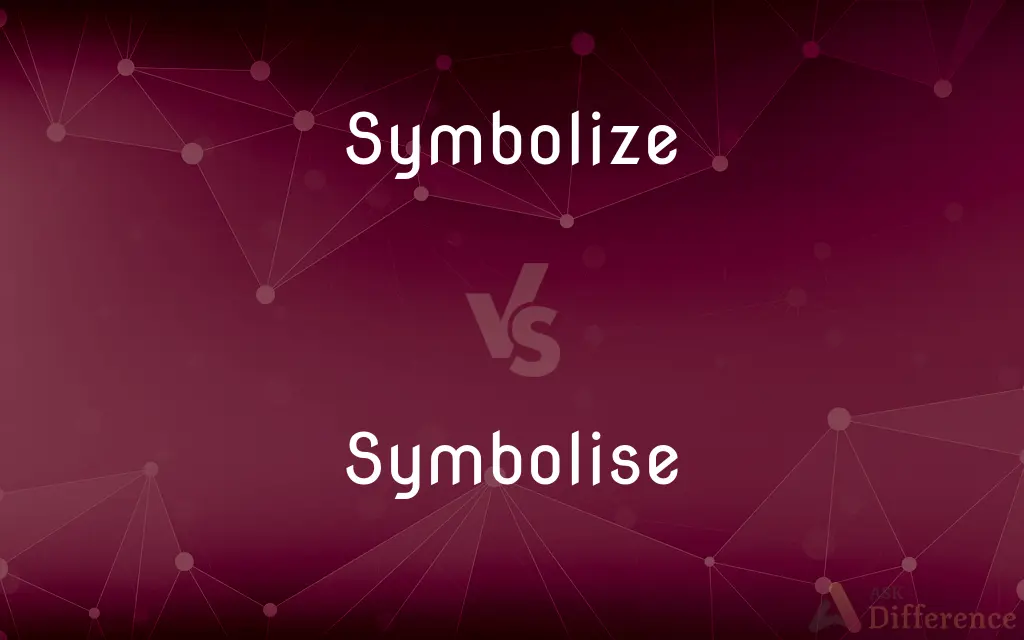Symbolize vs. Symbolise — What's the Difference?
By Fiza Rafique & Urooj Arif — Updated on April 7, 2024
Symbolize and symbolise differ only in spelling; the former is American English, while the latter is British English. Both terms mean to represent something abstract through symbols.

Difference Between Symbolize and Symbolise
Table of Contents
ADVERTISEMENT
Key Differences
Symbolize, in American English, refers to the act of representing ideas, qualities, or concepts through symbols or emblematic figures. Whereas symbolise, following British English spelling conventions, carries the exact same meaning, merely reflecting a difference in orthographic standards between the two versions of English.
The choice between "symbolize" and "symbolise" often depends on the audience's location or the established language norms of a publication. On the one hand, "symbolize" is favored in texts intended for an American audience, aligning with American spelling rules. On the other hand, "symbolise" is preferred in contexts adhering to British English, such as publications in the UK, Australia, and other Commonwealth countries.
Despite their spelling differences, both forms are used to describe the process of using symbols to convey more complex messages or abstract concepts. For instance, a dove can symbolize peace in literature, regardless of whether the American or British spelling is used.
In academic and professional writing, the choice between "symbolize" and "symbolise" might also reflect adherence to specific style guides, which often recommend consistency with either American or British English norms. Meanwhile, "symbolise" is typically used in academic texts and publications outside the United States.
The distinction between "symbolize" and "symbolise" highlights the broader variability in English spelling across different regions. However, the choice of spelling does not affect the term's meaning or its application in literary analysis, semiotics, or cultural studies.
ADVERTISEMENT
Comparison Chart
Spelling Variants
American English
British English
Usage
To represent something abstract through symbols
To represent something abstract through symbols
Example Sentences
The lion symbolizes courage in many cultures.
The lion symbolises courage in many cultures.
Considerations in Writing
Preferred in texts adhering to American spelling standards
Preferred in texts adhering to British spelling standards
Linguistic Preference
Favored by American publications
Favored by UK, Australian, and Commonwealth publications
Compare with Definitions
Symbolize
Used to analyze the significance of symbols across different societies.
In many cultures, water symbolizes life and renewal.
Symbolise
Adheres to British spelling conventions.
The colour green often symbolises envy in British novels.
Symbolize
To represent or express something through symbols.
The scales symbolize justice in legal contexts.
Symbolise
To denote or embody an idea, quality, or concept with a symbol.
The red rose symbolises love in English literature.
Symbolize
Recognized worldwide, though spelled differently.
The phoenix symbolizes rebirth in numerous mythologies.
Symbolise
Used in English-speaking countries outside the US.
Globally, the dove symbolises peace.
Symbolize
The standard spelling in the United States.
In American literature, the color white often symbolizes purity.
Symbolise
Preferred in scholarly articles and papers outside the US.
The study examines how trees symbolise life in ancient poetry.
Symbolize
A technique to convey deeper meanings.
The artist used darkness to symbolize despair.
Symbolise
Reflects the diversity of English spelling.
Across the Commonwealth, different symbols symbolise national identity.
Symbolize
(transitive) To be symbolic of; to represent.
Symbolise
(British spelling) symbolize
Symbolize
To serve as a symbol of
"Munich, the 1938 Hitler-Chamberlain meeting that now symbolizes the idea of appeasement" (Jonathan Alter).
Symbolise
Represent or identify by using a symbol; use symbols;
The poet symbolizes love in this poem
These painters believed that artists should symbolize
Symbolize
To represent or identify by a symbol.
Symbolise
Express indirectly by an image, form, or model; be a symbol;
What does the Statue of Liberty symbolize?
Symbolize
To use symbols.
Symbolize
(intransitive) To use symbols; to represent ideas symbolically.
Symbolize
To resemble each other in qualities or properties; to correspond; to harmonize.
Symbolize
To hold the same faith; to agree.
Symbolize
To have a resemblance of qualities or properties; to correspond; to harmonize.
The pleasing of color symbolizeth with the pleasing of any single tone to the ear; but the pleasing of order doth symbolize with harmony.
They both symbolize in this, that they love to look upon themselves through multiplying glasses.
Symbolize
To hold the same faith; to agree.
The believers in pretended miracles have always previously symbolized with the performers of them.
Symbolize
To use symbols; to represent ideas symbolically.
Symbolize
To make to agree in properties or qualities.
Symbolize
To make representative of something; to regard or treat as symbolic.
Symbolize
To represent by a symbol or symbols.
Symbolize
Express indirectly by an image, form, or model; be a symbol;
What does the Statue of Liberty symbolize?
Symbolize
Represent or identify by using a symbol; use symbols;
The poet symbolizes love in this poem
These painters believed that artists should symbolize
Common Curiosities
Can "symbolize" and "symbolise" be used interchangeably?
Yes, but usage should be consistent with the chosen variety of English.
Why does English have different spellings for the same word?
Variations in spelling reflect historical, cultural, and linguistic developments in different English-speaking regions.
How should I decide which spelling to use?
Choose based on your audience's location or the standards of the publication you are writing for.
What is the main difference between "symbolize" and "symbolise"?
The main difference is regional spelling; "symbolize" is American English, while "symbolise" is British English.
Is there any difference in meaning between the two terms?
No, they share the same meaning and differ only in spelling.
How does the digital age affect these spelling differences?
Digital communication and global media have increased exposure to both forms, but regional preferences remain strong.
Do style guides prefer one spelling over the other?
Style guides recommend using the spelling consistent with either American or British English, depending on the guide's focus.
Are both spellings recognized globally?
Yes, both spellings are recognized, but the preference depends on regional English conventions.
Can the choice of spelling affect readability?
It might for readers unfamiliar with the spelling conventions of the other form of English, but the impact is minimal due to the context.
In bilingual or ESL contexts, which spelling should be taught?
This depends on the regional focus of the educational program or the preferences of the educational institution.
Is one form more correct than the other?
No, both are correct within their respective linguistic contexts.
Can the spelling choice affect the SEO of online content?
Yes, spelling variations can impact SEO, making it important to align with the primary audience's language variant.
Why do British and American English have different spellings?
Differences stem from historical linguistic evolutions and the influence of lexicographers in each region.
Does using "symbolize" over "symbolise" imply American cultural dominance?
Not necessarily; it often simply reflects the writer's linguistic background or the intended audience.
Are there other words with similar American and British spelling differences?
Yes, many words differ between American and British English in spelling, such as "color" (American) and "colour" (British).
Share Your Discovery

Previous Comparison
Briar vs. Thorn
Next Comparison
Knowledge vs. KnowledgeableAuthor Spotlight
Written by
Fiza RafiqueFiza Rafique is a skilled content writer at AskDifference.com, where she meticulously refines and enhances written pieces. Drawing from her vast editorial expertise, Fiza ensures clarity, accuracy, and precision in every article. Passionate about language, she continually seeks to elevate the quality of content for readers worldwide.
Co-written by
Urooj ArifUrooj is a skilled content writer at Ask Difference, known for her exceptional ability to simplify complex topics into engaging and informative content. With a passion for research and a flair for clear, concise writing, she consistently delivers articles that resonate with our diverse audience.














































